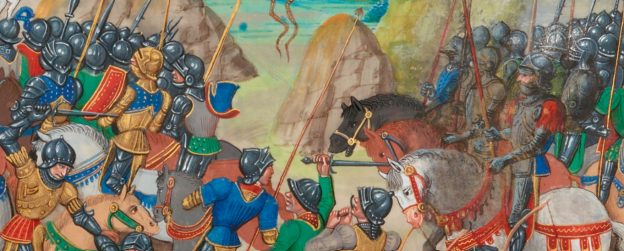Summary
Many of the psalms we have looked at are written in difficult times, and the reason for that is the psalm writers, like us, went through a variety of difficult times. These times may be personal or corporate, but they are still a far more apparent part of the Christian life than we care to believe today.
Psalm 35 once again cries out in lament at the unjust evils visited on God’s people. But it also encourages us to give thanks to God as well. There are three clear stanzas in the psalm, each ending on a note of praise. From this we can see that this Psalm encourages us to ask God to fight the battle, trusting in him for a deliverance that will come in his timing, and praising him as we wait.
Our passage explained
v1-10
The first stanza, in verses one to ten, expresses a cry for help. David asks God to “contend…with those who contend with me” (which has legal connotations) and to fight against those who fight against him (v.1). He speaks poetically of God taking up a defensive shield and offensive weapons to fight for David, declaring himself “your salvation” (vv.2-3).
David then appeals indirectly to God by invoking curses on his opponents, asking that God disgrace and shame them, make them as worthless as “chaff before the wind,” and bring confusion and stumbling upon them (vv.4-6). He does this because he is innocent; he is being attacked “without cause” (v.7). David seeks that their own attacks are turned against them (v.8).
The first stanza then finishes with praise, as David anticipates his “soul will rejoice in the LORD, exulting in his salvation” (v.9) and that God will deliver him from powerful foes (v.10).
v11-18
The second stanza in verses eleven to eighteen then provides a description of the enemies. David asked God to contend for him because “malicious witnesses” were accusing him in an irregular court with demands he cannot meet (v.11). He is punished unjustly, with “evil for good” which leaves him desolate (v.12). Their evil is made worse because when they were in strife he displayed mourning and grief for them (vv.13-14).
In contrast, when David’s strife arrives his enemies rejoiced and gathered to gloat (tear at him) and mock him (vv.15-16). This great evil visited on him leads David to cry out “how long, O Lord, will you look on? Rescue me from their destruction, my precious life from the lions!” (v.17)
Anticipating rescue, the second stanza finishes with David promising to thank and praise God for his deliverance amongst the gathered worshipers of God’s people (v.18).
v19-28
The third stanza in verses nineteen to twenty-eight raises a call for God’s deliverance. David asks God not to allow those who are wrongfully his enemies and look at him with hostility rejoice at his situation (v.19).
In verses twenty and twenty-one, it becomes clear that this hostility is from treaty partners who are attacking David and his people unjustly, on the basis of fake claims of treaty violations by David and his people. Since God witnessed both the covenant and the events, David asks him to intervene (v.22).
God is asked to intervene in the dispute, in both a legal and military sense. God is asked to awake and vindicate David (vv.23-24). If God does so, David’s enemies will not be able to speak in joy of David’s destruction and their getting their own way (v.25).
Instead of this fate, David asks for two contrasting outcomes. For his unjust enemies, he asks God to disgrace and shame them (v.26). But for his supporters, he desires that they would “shout for joy and be glad” at what God had done for him (v.27).
The third stanza (and psalm) then concludes with David anticipating the praise he will give to God, when “my tongue shall tell of your righteousness and of your praise all the day long” (v.28).
Our passage applied
Consistently through this psalm are two ideas. Firstly, a reliance upon God to fight and defeat David’s enemies. Secondly, praise offered in anticipation of God’s deliverance.
It may be tempting when we run into the latest unfounded attack, verbal or physical, against the Church and professing Christians here or around the world to charge into battle and overthrow the powers that enable it. But our fight is against the spiritual puppet masters (Eph. 6:12), not the lost sinners who are led along in the dark by those evil masters.
It is God who has delivered us from the domain of darkness, and will ultimately vindicate us and defeat all who persecute his Church. Like David, we should trust God to win the battle, not try to fight and defeat the enemy ourselves.
Instead, we should sing praises anticipating the full expression of God’s deliverance. We already experience the deliverance from sin and the prince of this age, but not yet to its fullness. In the meantime, we can in faith offer praise to God all the day long.
Resources
Questions? Please contact us. Inspired? Come and worship with us on Sundays.

